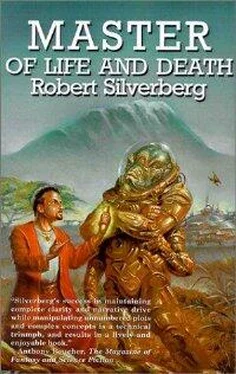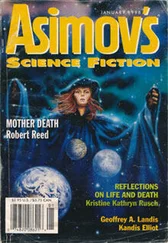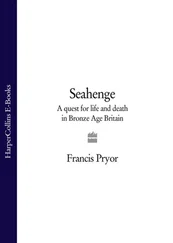As for the kaleidowhirl subterfuge—that, Walton admitted, was hitting below the belt. But he had resolved that all would be fair during the current crisis. There would be time enough for morality after war had been averted.
At about 1430 that day, Walton took advantage of a lull in activities to have a late lunch at the Bronze Room. He felt that he had to get away from the confining walls of his office for at least some part of the afternoon.
The Bronze Room had adopted cerise as its color scheme for the day. Walton selected a private room, lunched lightly on baked chlorella steak and filtered rum, and dialed a twelve-minute nap. When the alarm system in the foamweb couch stirred him to wakefulness, he stretched happily, some of the choking tension having been washed out of him.
Thoughtfully, he switched on the electroluminescent kaleidoscope and stared at it. It worked on the same principle as the kaleidowhirl programs beamed over the public video, except that the Bronze Room provided closed-channel beaming of its own kaleidoscopic patterns; tending more to soft greens and pale rose, they were on a higher esthetic plane, certainly, than the jagged, melodramatic purples and reds the video channels sent out for popular consumption.
But it was with a certain new apprehension that Walton now studied the kaleidoscopic pattern. Now that he knew what a dangerous weapon the flashing colors could be, how could he be certain that the Bronze Room proprietors were not flashing some scarcely seen subliminal command at him this very moment?
He turned the set off with a brusque gesture.
The ends justify the means. Anice homily, he thought, which allowed him to do almost anything. It brought to mind the rationale of Ivan Karamazov: without God, everything is permissible.
But both God and Dostoevski seem to be obsolete these days, he reminded himself. God is now a lean young man with an office on the twenty-ninth floor of the Cullen Building—and as for Dostoevski, all he did was write books, and therefore could not have been of any great importance.
He felt a tremor of self-doubt. Maybe it had been unwise to let kaleidowhirl propaganda loose on the world; once unleashed, it might not be so easily caged again. He realized that as soon as the Popeek campaign was over, he would have to make sure some method was devised for pre-checking all public and closed-channel kaleidoscopic patterns.
The most damnable part of such propaganda techniques, he knew, was that you could put over almost any idea at all without arousing suspicion on the part of the viewer. He wouldn’t know he’d been tampered with; you could tell him so, after the new idea had been planted, and by then he wouldn’t believe you.
Walton dialed another filtered rum, and lifted it to his lips with a slightly shaky hand.
“Mr. Ludwig of the United Nations called while you were out, sir,” Walton was told upon returning to his office. “He’d like you to call him back.”
“Very well. Make the connection for me.”
When Ludwig appeared, Walton said, “Sorry I missed your call. What’s happening?”
“Special session of the Security Council just broke up. They passed a resolution unanimously and shipped it on to the Assembly. There’s going to be an immediate hearing to determine the new permanent head of Popeek.”
Walton clamped his lips together. After a moment he said, “How come?”
“The Dirnan crisis. They don’t want a mere interim director handling things. They feel the man dealing with the aliens ought to have full UN blessing.”
“Should I interpret that to mean I get the job automatically?”
“I couldn’t swear to it,” said Ludwig. “General consensus certainly favors you to continue. I’d advise that you show up at the hearing in person and present your program in detail; otherwise they may stick some smooth-talking politico in your place. The noise is slated to start at 1100, day after tomorrow. The eighteenth.”
“I’ll be there,” Walton said. “Thanks for the tip.”
He chewed the end of his stylus for a moment, then hastily scribbled down the appointment. As of now, he knew he couldn’t worry too strongly about events taking place the day after tomorrow—not with Fred arriving for a showdown the next morning.
* * *
The next day began busily enough. Hervey was the first to call.
“The Citizen’s sewed up, Roy! I had dinner with Murlin last night and weaseled him out of four percent of Citizen stock in exchange and for a fancy tip on the new monorail project outNevada way. He was grinning all over the place—but I’ll bet he’s grinning out of the other side of his mouth this morning.”
“Is it all arranged?” Walton asked.
“In the bag. I was up by 0700 and consolidating my holdings— your holdings, I mean. Forty-seven percent of the stock I had fragmented in a dozen different outfits; the other two percent outstanding belonged to rich widows who wouldn’t sell. I lumped the forty-seven percent together in your name, then completed the transfer on Murlin’s four percent and stuck that in there too. Citizen telefax is now the property of Popeek, Roy!”
“Fine work. How much did it cost?”
Then he said, “Four hundred eighty-three million and some change. Plus my usual five percent commission, which in this case comes to about two and a quarter million.”
“But I offered you five million,” Walton said. “That offer still goes.”
“You want me to lose my license? I spend years placing bribes to get a slyster’s license, and you want me to throw it away for an extra couple million? Uh-uh. I’ll settle for two and a quarter, and damn good doing I call that for a day’s work.”
“Walton grinned. ”You win. And Sue Llewellyn will be glad to know it didn’t cost the whole billion to grab Citizen. You’ll be over with the papers, won’t you?“
“About 1000,” the slyster said. “I’ve gotta follow through for Murlin on his monorail deal first. The poor sucker! See you in an hour.”
“Right.”
Rapidly Walton scribbled memos. As soon as the papers were in his hands, he’d serve notice on Murlin that a stockholders’ meeting was to be held at once. After that, he’d depose Murlin, fire the present Citizen editors, and pack the telefax sheet with men loyal to Popeek.
Fred was due at 1100. Walton buzzed Keeler, the new security chief, and “said, ”Keeler, I have an appointment with someone at 1100. I want you to station three men outside my door and frisk him for weapons as he comes in.“
“We’d do that anyway, sir. It’s standard procedure now.”
“Good. But I want you to be one of the three. And make sure the two who come with you are tight-mouthed. I don’t want any newsbreaks on this.”
“Right, sir.”
“Okay. Be there about 1050 or so. About 1115, I’m going to press my door opener, and I want you and your men to break in, arrest my visitor, and spirit him off to the deepest dungeon security has. And leave him there. If Martinez wants to know what’s going on, tell him I’ll take responsibility.”
Keeler looked vaguely puzzled, but merely nodded. “We frisk him first, then let him talk to you for fifteen minutes. Then we come in on signal and take him away. I’ve got it.”
“This man’s a dangerous anti-Popeek conspirator. Make sure he’s drugged before he gets out of my office. I don’t want him making noise.”
The annunciator sounded. “Man from Communications has a message for you, Mr. Walton.”
He switched over from Keeler to Communications and said, “Go ahead.”
“From McLeod, Mr. Walton. We just got it. It says, ‘Arriving Nairobi on the 18th, will be in your office with Dirnan following morning if he feels like making the trip. Otherwise will you come to Nairobi?’”
Читать дальше












